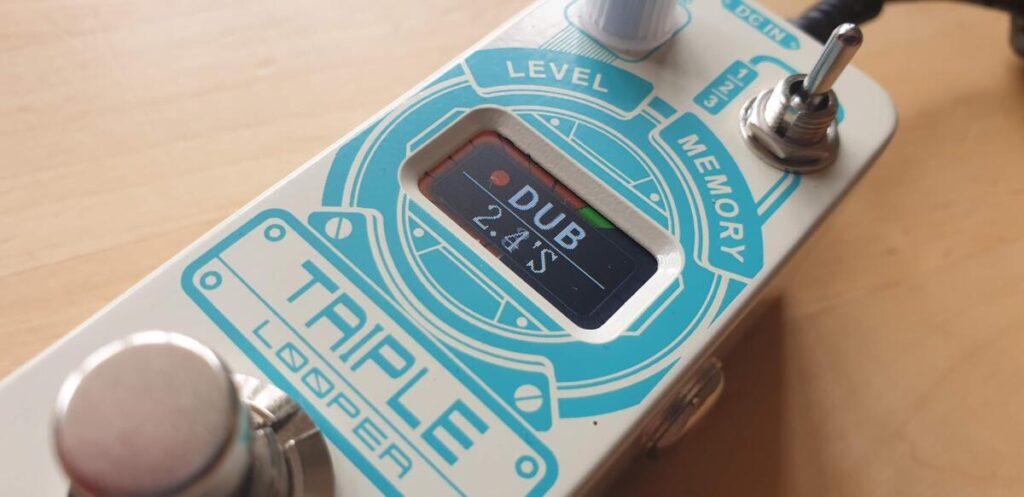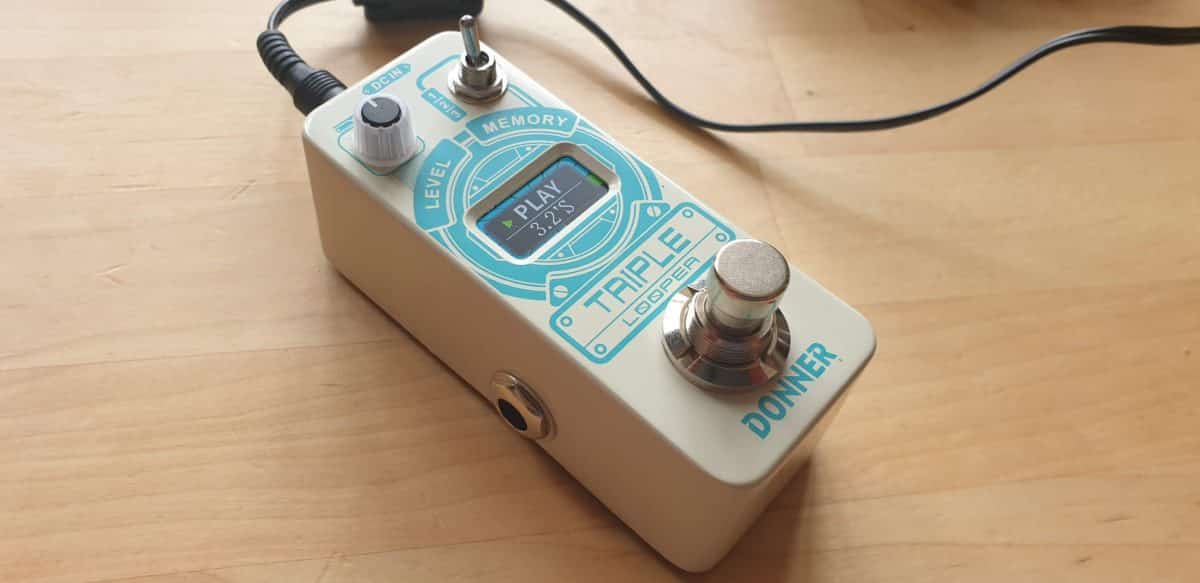Is my first looper pedal all I’ll ever need? Is the Donner Triple Looper all you’ll ever need in a looper pedal?
Looper Pedals: Why the long wait?
Before the Donner Triple Looper, I can’t say I’ve ever been drawn to looper pedals. I’ve seen them before on Multi-FX units (the BOSS ME-80 in particular), but they’ve always come across as a clunky gimmick, an afterthought to the main FX.
Then there are the artists that use them. Ed Sheeran is the guy that made them cool, but, clever as he is, I would place talent over looper skills any day.
And lastly, well, a looper isn’t really a guitar effect at all is it?
In other words, I’ve given looper pedals a wide birth…. until now!
What is a Looper Pedal?
In this case, a guitar pedal that records and plays back your phrases in real-time. But not only that, they allow overdubs on the phrases you’re playing back, with the ability to undo and redo them. Often (like the Donner Triple Looper) they feature save slots to capture your ideas, plus various controls to control playback volume, etc.
It’s hard to get your head around, particularly in a micro-format, single-switch pedal, and another reason for me staying away from loopers thus far. But here’s the thing.
The Donner Triple Looper makes all this complex functionality child’s play.
Donner Triple Looper: Features.
Before I explain, here are some specs from Donner Music.
- Maximum Recording Time of Single Track: 30 minutes.
- Playback volume control.
- Single footswitch operation.
- Loop Channel Toggle Switch with 3 recording slots.
- Maximum of Dub Tracks: Unlimited
- Single Input / Output.
- Power Requirements: DC 9V 300mA (no battery power).
- Dimensions: 42mm x 93mm x 52mm (W*D*H)
- Weight: 156.1g
- All-metal chassis, jacks, and switches
Donner Triple Looper: Ease of use.
Let’s get straight to it. Set the level (playback volume) to 12 o’clock (or to taste) and you’re good to go, which is the beauty of a stand-alone unit, rather than one integrated into a multi-fx unit.
At this point, I still had my doubts. I’d end up in a mess, wouldn’t I, or at least I’d need perfect timing to stay in sync. So. here we go……
Starting from scratch, first of all, the unit clearly displays which of the memory slots is active on its bright LCD screen (nice!), and the first stomp from this dinosaur puts you into Play mode, again clearly displayed, this time with a blue progress indicator looping around the LCD border.

This is where the fun begins. Use Play mode to run through what you’d like to loop, for as soon as you stomp again, Dub (overdub) mode is activated, recording your phrase, until you stomp again, where Play mode is re-engaged, which now plays back your phrase.
Before it gets too complicated, let me give you an example.
In Play mode, I’m looking to lay down a simple track of muted, rhythmic, strums. Put down a beat, nothing more. When I’m happy with it, I’m ready to stomp and engage…
Dub mode, with the timing of the stomp being critical. Once I’ve laid down the track I time to next stomp to end the phrase, with the Donner Triple Looper now reverting back to Play mode and playing back the loop I just recorded of muted strums.
Now then, Let’s put a proper chord progression over the top of that. So, still in Play mode, I practice a few ideas, and how it fits with the first track/loop. When I’m happy, I get ready to stomp again and engage Dub mode on the beat, using the handy illuminated progress bar for reference. When done, another stomp gets me back into Play mode again, but this time with the muted rhythm strums and chords tracks playing together, ready for a bit of lead maybe?
… and it’s so much harder explaining this in words than actually doing it!
But there’s more. In addition to a single-stomp to start up and toggle between Play and Dub modes. the Donner Triple Loopers also offers:
Undo/Redo with a 2-second hold on the footswitch. Say for example you are in Dub mode and you make a mistake. Holding the footswitch for 2 seconds wipes the change, and displays ‘Undo’ on the display. Hold it again, and you can Redo the change in case you change your mind, with ‘Redo’ showing on the LCD this time.
Stop with 2 stomps in quick succession. This one caught me out. It can be easy to get carried away and not know how to stop the loop, which could be embarrassing in a live situation, to say the least. 2 quick stomps are the answer, getting you back to the looper’s initial state.
Speaking of states. If you’ve stopped the loop, or haven’t started one yet, a 2-second stomp/hold will clear the current memory slot. again clearly displayed.
As you’ve probably guessed, there’s quite a bit of complex functionality going on here, made even more complex by the lack of controls. But the genius of the Donner Triple Looper’s design is I was able to make sense of and navigate through it, even without a manual, and with a fair bit of lingering looper prejudice.
The Looper Pedal: Three Inspirational Applications.
Now that the Donner Triple Looper finally made some sense of it all. I started to relax a little, and enjoy it, with a whole new world of inspiration opening up in front of me.
The Looper Pedal as a songwriting tool.
Without a looper pedal, there’s been often a time where I’ve had a chord progression that didn’t go anywhere. I’ve played it, hummed along to it, sometimes that would be enough, other times I gave up. With a looper, you have immediate access to record the progression and try out ideas over the top of it in real-time, and this immediacy changes your songwriting mindset, it takes you out of your box. Also, the concept of being in a loop removes the stop/start element of other methods and kind of fast-tracks your progress.
Sometimes you need that creative spark, that jerk out of the rut. And this pedal is just that.
The Looper Pedal as a practice tool.
The above concepts don’t need to be restricted to songs. Whack down a backing track with some rhythm guitar and, there you go, instant lead guitar practice, or even better split-lead harmony practice. Then take that back to your song and complete the circle. It’s nice to have this facility in a guitar-pedal format, keeping everything together and simple. Us guitarists need simple, sometimes.
The Looper Pedal as a live tool.
Going back to Ed Sheeran. If you’re well-practiced and plan ahead, you could effectively replace your rhythm guitarist in a band, and ultimately use a looper to provide your full backing.
I guess what I’m trying to say is that a looper pedal is limited only by your imagination.
How good is the Donner Triple Looper?

Very good indeed.
Granted, I’ve had no experience of looper pedals until now, but I’d like to highlight a few things that stood out about the Donner Triple Looper.
Price. The Donner Triple Looper retails for a staggering £50! That’s a lot less expensive than a TC Electronic Ditto Loop Pedal (beating it on features) and half the price of a BOSS RC-1 Compact Loop Station.
Loop time of 30 minutes. This top trumps the 5 minutes and 12 minutes loop times on the TC and BOSS respectively. There is the argument that a looper doesn’t need a loop time of 30 minutes, but that depends on the application and a win is a win after all. For me, not having a time restriction is better than having one, especially live.
3 Memory Slots. I love this feature. More expensive loopers have the option of connecting to a PC or whatever, but I think that contradicts the organic, on-the-fly looper workflow and vibe. The Donner Triple Looper makes things immediate, intuitive, and fun, out of the box.
The LCD Display. A massive plus. Absent on the Ditto and with more variation than the Loop Station, the colourful, bright, and clear display simply tells you what’s going on, and where you’re at, with minimal fuss. It’s great.
Check out my unboxing / first impressions vid here.
Negatives? There always has to be some, and for me, the Donner Triple Looper has two that are part and parcel of the mico-pedal format.
No battery power. A necessary drawback of the mico-pedal format. Where would the battery go? Also remember that a looper pedal, which could potentially get heavy use over the course of a gig, and more so in other situations, probably isn’t the best candidate for battery power anyway.
Stability. Micro-pedals, because of their dimensions, sit a little high in relation to their width on a pedalboard for example, which could lead to wobbling and dislodging. The solution is to use pedal connectors (rather than patch cables) and sandwich them between two other pedals. Not ideal, but you can’t break the law of Physics.
Lastly, and it’s harsh to point this out on, what is, an astonishing looper pedal at a very affordable price point, is that the jacks and switch don’t feel quite as quality as the Donner Dumbal Drive I reviewed recently. The jacks have metal over the rubber washers of the Dumbal (which I preferred), and the switch feels less positive.
It’s worth mentioning that the Dumbal Drive, although a fantastic product, doesn’t fall into the budget price point for overdrive pedals, having some home comforts still intact, but with regard to loopers, the Triple looper is an absolute steal, so I can live with a couple of very minor concessions, especially when it functions as perfectly as this.
Conclusion.
And that’s about all there is to say. Similar to a delay pedal, I can’t comment on the intricacies of tone, as a looper pedal isn’t doing anything with it. What I will say is, functionally at least, the Donner Triple Looper, more than any other pedal I’ve owned, does what exactly it says on the tin, placing no frustrations or restrictions on the user whatsoever.
Sections of this review have focussed on the benefits of loopers in general, and the best thing about this unassuming pedal is that it has opened the door to a looper doubter by providing an organic, immediate, intuitive, easy, and most of all fun experience that I know will benefit my playing, my songwriting and my musical journey in general.
For a first looper pedal, it’s perfect. But even going up the food chain I’ve found it impossible to recommend anything else.
If you enjoyed my review please check out the Donner Triple Looper here.

Leave a Reply